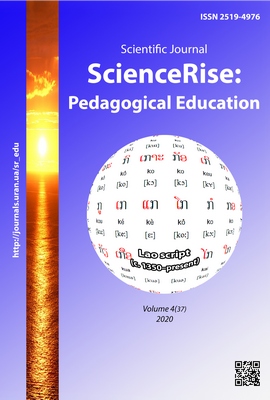Innovative approaches to formation of practical skills in medical students during teaching the basics of child pulmonology
DOI:
https://doi.org/10.15587/2519-4984.2020.208604Keywords:
teaching, students, practical skills, pediatric pulmonologyAbstract
The training of future doctors in the conditions of reforming the Health Care in Ukraine requires the introduction of new methods, information and communication technologies, modern pedagogical and scientific innovations in accordance with world standards in the educational process. The purpose of the work was to improve the educational process on the Department of Propedeutics of pediatric diseases while teaching the students the basics of pediatric pulmonology. The article describes the stages of conducting practical classes, describes the method of forming practical skills in students during teaching children's pulmonology. In order to improve the practical training of students at the department, simulation methods are actively used, which allow to master the technique of auscultation in children, to differentiate acoustic phenomena in different pathological conditions. During the curation, future doctors will consolidate practical skills in the examination of the patient, summarize the data obtained. Digital respiratory sonography allows us to analyze whether the findings of the research students on the acoustic picture, obtained while listening to the lungs with stethoscopes, coincide with the results of a computer analysis of pulmonary sounds. As the results show, students' acquisition of practical skills on virtual simulators contributes to a more successful mastering of methods of physical examination of the patient, correct assessment of a particular clinical situation. Combining traditional teaching methods with innovative methods contributes to improving the quality of students' education and training of a new generation of highly skilled health care workers. Bringing to the international standards the educational and methodological support of the educational process, on the one hand, will reduce the outflow of young people, who want to study outside Ukraine, on the other hand – will allow to attract foreign students to Ukrainian medical universitets, which can become an additional source of state income in the form of tuition fees, and also contribute to the inflow of labor into domestic medicine
References
- Romanyuk, L., Kravets, N. (2018). A structured approach to the teaching of microbiology, virology and immunology for medical students. ScienceRise: Pedagogical Education, 6 (26), 30–33. doi: http://doi.org/10.15587/2519-4984.2018.140910
- Anikin, V. V., Aleksеnko, A. S., Izvarina, O. A., Shehovtsov, V. P. (2013). Modern methods of practical skills studying: first results of collaboration of department of propedeutics of internal diseases and training center. Upper Volga Medical Journal, 11 (3), 42–44.
- Palamarchuk, A. V., Vlasenko, M. V., Vernyhorodskyi, V. S. (2017). Shliakhy vdoskonalennia praktychnoi pidhotovky studentiv-medykiv. Pidhotovka medychnykh kadriv u suchasnykh umovakh reformy systemy okhorony zdorovia Ukrainy. Vinnytsia, 135–136.
- Ilchenko, S., Yaroshevskaya, T., Skryabina, E., Kramarenko, N. (2018). Analysis of the level of knowledge of pediatric propaedeutics, taught in junior courses among young doctors. ScienceRise: Pedagogical Education, 7 (27), 28–32. doi: http://doi.org/10.15587/2519-4984.2018.153376
- Iurev, V. V., Novikova, V. P., Simakhodskii, A. S. (Eds.) (2015). Znanie propedevtiki – osnova klinicheskogo myshleniia pediatra. Saint Petersburg: InforMed, 352.
- Bakirova, R. E., Nursultanova, S. D., Muravleva, L. E., Tusupbekova, K. T., Turkhanova, Z. Z., Ashirbekova, B. D. (2018). Inovative technologies in training of students of medicine. Modern problems of science and education, 3. Available at: http://www.science-education.ru/ru/article/view?id=27703 Last accessed: 10.12.2019
- Berezuckii, V. I., Kravchenko, A. I. (2015). Ispolzovanie sovremennykh tekhnologii v organizacii izucheniia propedevtiki vnutrennikh boleznei. Nauka. Іnnovacіi. Progres. Kyiv: Naukovo-vidavnichii centr «Laboratorіia dumki», 33–34.
- Sverdrup, Ø., Jensen, T., Solheim, S., Gjesdal, K. (2010). Training auscultatory skills: computer simulated heart sounds or additional bedside training? A randomized trial on third-year medical students. BMC Medical Education, 10 (1). doi: http://doi.org/10.1186/1472-6920-10-3
- Bugaj, T. J., Nikendei, C. (2016). Practical Clinical Training in Skills Labs: Theory and Practice. GMS Journalfor MedicalEducation, 33 (4). doi: http://doi.org/10.3205/zma001062
- Blohm, M., Lauter, J., Branchereau, S., Krautter, M., Köhl-Hackert, N., Jünger, J. et. al. (2015). "Peer-assisted learning" (PAL) in the Skills-Lab--an inventory at the medical faculties of the Federal Republic of Germany. GMS Z Med Ausbild, 32 (1). doi: http://dx.doi.org/10.3205/zma000952
- Weller, J. M., Nestel, D., Marshall, S. D., Brooks, P. M., Conn, J. J. (2012). Simulation in clinical teaching and learning. Medical Journal of Australia, 196 (9), 594–594. doi: http://doi.org/10.5694/mja10.11474
- Hough, J., Levan, D., Steele, M., Kelly, K., Dalton, M. (2019). Simulation-based education improves student self-efficacy in physiotherapy assessment and management of paediatric patients. BMC Medical Education, 19 (1). doi: http://doi.org/10.1186/s12909-019-1894-2
- Antypkin, J. G., Chumachenko, N. G., Umanets, T. R., Lapshin, V. F. (2016). The aspects of respiratory organs pathological conditions dynamics among child population. Sovremennaya pediatriya, 2 (74), 73–77. doi: http://doi.org/10.15574/sp.2016.74.73
- Ilchenko, S. I., Duka, K. D., Yefanova, A. O. (2017). Respiratorna akustyka ta yii klinichna interpretatsiia v pediatrii. Dnipro, 84.
- Ilchenko, S. I. (2013). The modern methods of respiratory function estimation in infants and their usage for students teaching of children pulmonology. Problems of uninterrupted medical training and science, 2, 18–23.
Downloads
Published
How to Cite
Issue
Section
License
Copyright (c) 2020 Svetlana Ilchenko, Anastasiia Fialkovska

This work is licensed under a Creative Commons Attribution 4.0 International License.
Our journal abides by the Creative Commons CC BY copyright rights and permissions for open access journals.
Authors, who are published in this journal, agree to the following conditions:
1. The authors reserve the right to authorship of the work and pass the first publication right of this work to the journal under the terms of a Creative Commons CC BY, which allows others to freely distribute the published research with the obligatory reference to the authors of the original work and the first publication of the work in this journal.
2. The authors have the right to conclude separate supplement agreements that relate to non-exclusive work distribution in the form in which it has been published by the journal (for example, to upload the work to the online storage of the journal or publish it as part of a monograph), provided that the reference to the first publication of the work in this journal is included.








